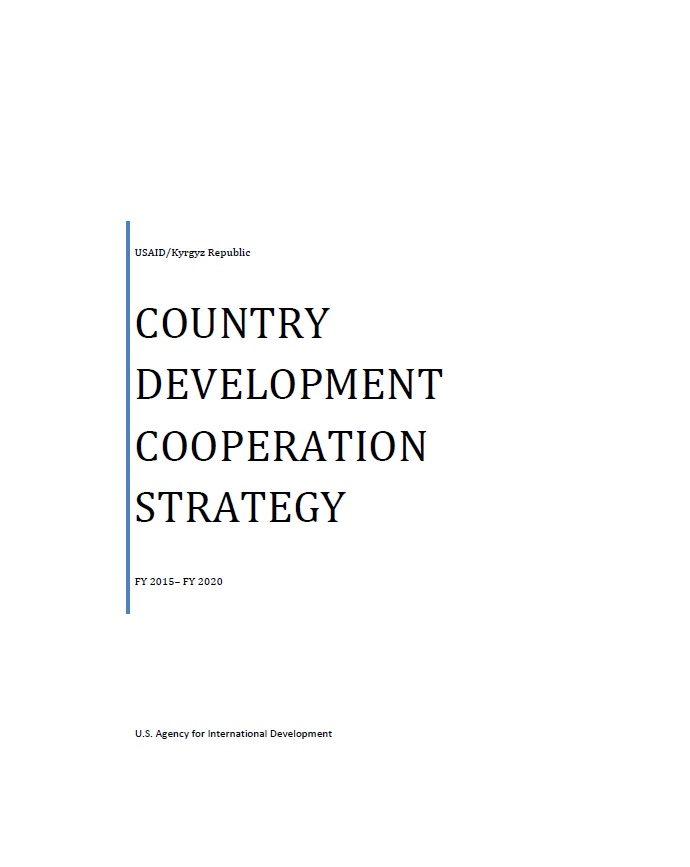Speeches Shim
The Kyrgyz Republic is located in the heart of Central Asia and is of crucial importance to U.S. foreign policy goals.
This small, landlocked, former Soviet country features a nascent democracy, a vibrant and increasingly influential civil society, and robust cooperation with the U.S. on a number of issues. While it has been successful in lowering its rate of extreme poverty, over 38% of the population remains below the national poverty line. Continued U.S. Government development assistance will help the country consolidate its encouraging progress toward accountable, inclusive governance, and reap significant development outcomes such as increased economic opportunities and increased resilience to shocks.
Under this Country Development Cooperation Strategy (CDCS) for the U.S. fiscal years 2015-2019, USAID can build on the Government’s commitment to further reform in democracy and the social sectors as well as relatively strong recent economic growth in order to achieve the CDCS goal of assisting in the development of a democratic, well-governed, and prosperous Kyrgyz Republic. This goal is based on the hypothesis that if government institutions’ relationship with the citizenry is characterized by increasing accountability and inclusiveness, then its main ‘deliverables’ – service delivery and policy – will improve across all socio-economic development sectors, thus increasing the legitimacy and stability of the Kyrgyz Republic’s nascent democracy.
This goal reflects the significant democratic gains that the country has made in the past few years, as well as the remarkable vibrancy of its civil society through periods of renewed authoritarianism. USAID/Kyrgyz Republic is confident that the parliamentary democracy established by the 2010 constitution has developed strong foundations. Governing coalitions have dissolved and reformed, elections have been held peacefully and fairly, and most political parties and leaders see the advantages of participation in the democratic system. That is not to say that the democratic system is fully consolidated. In order for its democracy to be fully established, the Kyrgyz Republic must strengthen the rule of law and fight corruption, increase the level of inclusion and protection for all people – particularly ethnic minorities and women, and expand the role of civil society in providing oversight over the democratically elected government in order to enable the citizenry to peacefully and responsibly hold their government accountable.
While improvements in democracy are vital for the future of the Kyrgyz Republic, USAID/Kyrgyz Republic believes that the success of this democratically-elected government is fundamentally dependent on its ability to improve the lives of its citizens through their increased opportunities, ability to realize their full human potential, and freedom of expression in all its forms. This requires improvements in essential services that bring outcomes that the population can see and feel – in particular improvements to education and health.
Finally, the Kyrgyz Republic’s economy must be able to sustain the services and opportunities that the population needs to improve their overall quality of life. The country’s productivity in key sectors, including agriculture, is not sufficient to drive employment, trade, and economic growth. The population is not sufficiently prepared to participate in the modern workforce, and improvements to the business environment are needed to encourage increased investment and the expansion of job-creating sectors.
With this background, USAID/Kyrgyz Republic has identified three Development Objectives (DOs) necessary to achieve the goal of a democratic, well-governed, and prosperous Kyrgyz Republic. These three objectives are mutually reinforcing, and each is required to achieve the CDCS goal. As all citizens are better able to interact with government in an inclusive and accountable democracy, the legitimacy and effectiveness of the country’s nascent political and civil society institutions will grow. As the ability of governing institutions to better deliver services expands to include all segments of society, the environment and capacity for economic growth will improve. Similarly, with a stronger economy and empowered private sector, the Kyrgyz Republic’s ability to effectively mobilize revenues will increase and better enable service delivery.
Development Objective 1: Inclusive and accountable democracy: This DO seeks to build inclusive and accountable democracy by increasing the participation of all citizens in democratic processes, increasing mutual accountability between citizens and government, and protecting the universal human rights of all citizens.
Development Objective 2: Improved service delivery and policies for all citizens: This DO seeks to improve service delivery and policies for all citizens through building the capacity of key state bodies to govern, increasing the use of quality public services (particularly health and education), and increasing civil society partnerships with government for improved policy and service delivery.
Development Objective 3: Accelerated growth of diversified and equitable economy: This DO seeks to build accelerated growth of a diversified and equitable economy through expanded human capital, an improved business enabling environment, and improved competitiveness of key economic sectors.
This CDCS will be implemented in close coordination with the USAID/Central Asian Republics Regional Cooperation and Development Strategy in recognition of the fact that the Kyrgyz Republic is an important player in the long-term stability and prosperity of the Central Asian region – including Afghanistan and Pakistan. Just as stability and cooperation with its neighbors is vital for the Kyrgyz Republic’s development, this country has the potential to serve as a model for democracy in the region.
Extended through: December 31, 2020



Comment
Make a general inquiry or suggest an improvement.